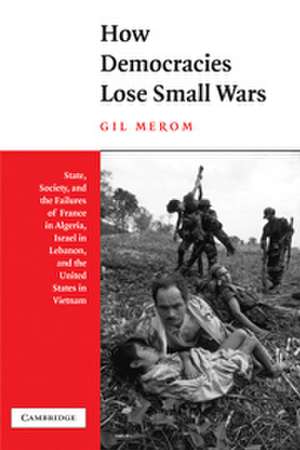How Democracies Lose Small Wars: State, Society, and the Failures of France in Algeria, Israel in Lebanon, and the United States in Vietnam
Autor Gil Meromen Limba Engleză Hardback – 3 aug 2003
| Toate formatele și edițiile | Preț | Express |
|---|---|---|
| Paperback (1) | 279.86 lei 6-8 săpt. | |
| Cambridge University Press – 3 aug 2003 | 279.86 lei 6-8 săpt. | |
| Hardback (1) | 558.61 lei 6-8 săpt. | |
| Cambridge University Press – 3 aug 2003 | 558.61 lei 6-8 săpt. |
Preț: 558.61 lei
Preț vechi: 627.65 lei
-11% Nou
Puncte Express: 838
Preț estimativ în valută:
106.91€ • 111.19$ • 89.46£
106.91€ • 111.19$ • 89.46£
Carte tipărită la comandă
Livrare economică 15-29 martie
Preluare comenzi: 021 569.72.76
Specificații
ISBN-13: 9780521804035
ISBN-10: 0521804035
Pagini: 310
Ilustrații: 2 b/w illus. 16 tables
Dimensiuni: 152 x 229 x 21 mm
Greutate: 0.63 kg
Editura: Cambridge University Press
Colecția Cambridge University Press
Locul publicării:New York, United States
ISBN-10: 0521804035
Pagini: 310
Ilustrații: 2 b/w illus. 16 tables
Dimensiuni: 152 x 229 x 21 mm
Greutate: 0.63 kg
Editura: Cambridge University Press
Colecția Cambridge University Press
Locul publicării:New York, United States
Cuprins
1. Introduction; 2. Military superiority and victory in small wars: historical observations; 3. The structural original of defiance: the middle-class, the marketplace of ideas, and the normative gap; 4. The structural origins of tenacity: national alignment and compartmentalization; 5. The French war in Algeria: a strategic, political, and economic overview; 6. French instrumental dependence and its consequences; 7. The development of a normative difference in France and its consequences; 8. The French struggle to contain the growth of the normative gap and the rise of the 'democratic agenda'; 9. Political relevance and its consequences in France; 10. The Israeli war in Lebanon: a strategic, political, and economic overview; 11. Israeli instrumental dependence and its consequences; 12. The development of a normative difference in Israel and its consequences; 13. The Israeli struggle to contain the growth of the normative gap and the rise of the 'democratic agenda'; 14. Political relevance and its consequences in Israel.
Recenzii
'Anyone who thinks the recent victories in Afghanistan and Iraq show that America's military machine is invincible should read Gil Merom's terrific new book. It not only reminds us that powerful democracies sometimes lose wars against weaker foes, as happened with the United States in Vietnam and Israel in Lebanon, but it also provides a compelling explanation for these surprising outcomes.' John J. Mearsheimer, University of Chicago
'This brilliant and unconventional book about the domestic sources of war combines broad historical sweep with sharp analytical insights. As American military power reigns supreme, this book argues that many Western governments are so deeply constrained that even wars that can be militarily won have become politically infeasible. The strength of the weak in international relations derives from a shift in the relations between state and society in the First World rather than the unifying force of nationalism in the Third World. The implications of this far-reaching claim for our understanding of world politics are worth pondering for all students of war and contemporary world politics.' Peter J. Katzenstein, Cornell University
'Merom's argument is highly timely and his theoretical framework is more developed (both formally and with historical evidence) than that of others who have made a similar argument.' Journal of Peace Research
'This brilliant and unconventional book about the domestic sources of war combines broad historical sweep with sharp analytical insights. As American military power reigns supreme, this book argues that many Western governments are so deeply constrained that even wars that can be militarily won have become politically infeasible. The strength of the weak in international relations derives from a shift in the relations between state and society in the First World rather than the unifying force of nationalism in the Third World. The implications of this far-reaching claim for our understanding of world politics are worth pondering for all students of war and contemporary world politics.' Peter J. Katzenstein, Cornell University
'Merom's argument is highly timely and his theoretical framework is more developed (both formally and with historical evidence) than that of others who have made a similar argument.' Journal of Peace Research
Descriere
This 2003 book examines how modern democracies fail in insurgency wars because they are unable to find a winning balance.















